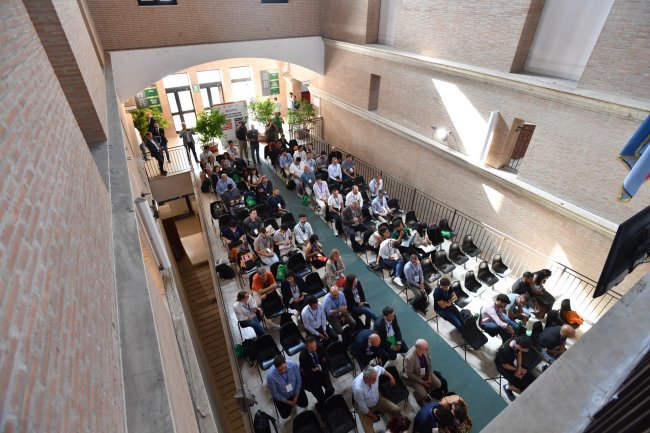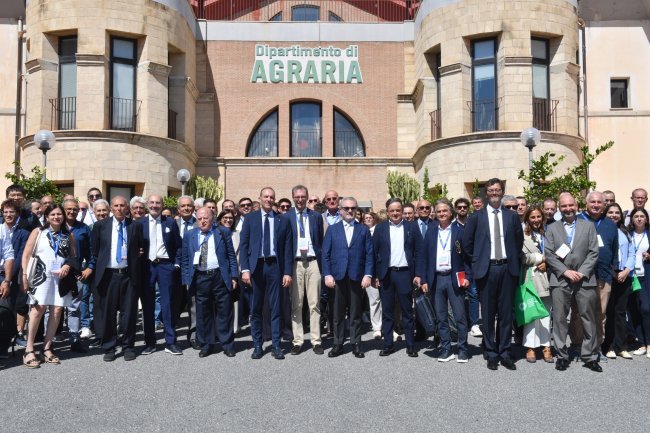The AIIA conference was a resounding success, culminating in the appointment of Rector Zimbalatti as President for the four-year term 2026-2029.
The three-day International Conference of the Italian Association of Agricultural Engineering, which concluded yesterday at the Department of Agriculture of the Università Mediterranea di Reggio Calabria, was met with great success in terms of participation, content, and hospitality.
The thirteenth edition attracted a record number of participants, more than three hundred national and international scholars, confirming the prestige and power of attraction enjoyed by the Italian Association of Agricultural Engineering and the University of Reggio Calabria.
“ A participation that makes us very happy and which has exceeded all our rosiest expectations .” This was the opening statement by Professor Giuseppe Giordano, Professor of Agricultural Hydraulics at the University of Palermo, whom the Rector of the Università Mediterranea, Professor Giuseppe Zimbalatti, will replace as President of the Italian Association of Agricultural Engineering (AIIA) for the next four-year period 2026-2029.
Furthermore, the 186 papers presented and discussed over the three days further enhanced and enriched the scientific and cultural debate, offering responses to the most current challenges related to increasingly sustainable agriculture, in step with the world's growing need for food.
All this thanks to a rich program of food for thought, divided into the seven sections of the AIIA: Land and Water Use; Rural Construction, Plants, and Territory; Mechanization and Technologies for Agricultural Production; Agricultural Electrification and Energy Use; Ergonomics and Work Organization; Machinery and Plants for Agricultural Processing; Information and Communication Technologies.
At the heart of the dialogue is the ecological transition, which becomes a key factor and calls for strengthening collaboration between the university, research, and the economic fabric. Three intense days, full of insights and opportunities. Rector Zimbalatti began by extending his thanks to Professor Giordano, his closest collaborator Piero Catania, and the entire team for having successfully addressed the objective challenges of COVID-19 and promoted interesting activities on the scientific and research fronts. Liveliness and relevance are the cornerstones of this association, of which I am honored to assume the presidency. It thrives on contemporaneity and has a profound vision for the future, as demonstrated by the scientific events in Palermo, Padua, and Reggio, which focused on strategic issues including the green transition. It was wonderful to meet so many young people over these three days, whom we will strive to raise awareness of the association's values during our next term, knowing that—in the age of artificial intelligence—connections and relationships are fundamental . Zimbalatti also emphasized the importance of teamwork. " The Italian Association of Agricultural Engineering is a great group. Together, we will strive to carry out fruitful work by enhancing our activities, bringing our young people closer to the research environment, and seeking to be useful to the country's production system, especially by leveraging our scientific and technical strengths ."
Marco Poiana, Director of the Department of Agriculture, expressed his satisfaction. " We feel privileged to have hosted such a representative and diverse platform, which offered an opportunity for dialogue and exchange of experiences and allowed us to reaffirm the mission of a Department centered on a whole range of outreach activities. The opportunity was also to emphasize environmental sustainability, which is the cornerstone upon which to build the most current and complex challenges facing us. Our commitment is in this direction: to update and innovate the training program and to give due importance to key elements, including the green transition ."
Among the most authoritative contributions was that of the Rector of the University of Bologna, Giovanni Molari, for whom " intelligent machines can lead to objectives that are at the heart of our commitment in a spirit of networking between professors, businesses, trade associations, and the economy. The real challenge is to pool what has been built over time ." Also highly appreciated were the presentations by Professor Josè Blasco on the opportunities of artificial intelligence and Professor Alessandra Gentile on new approaches to sustainability in agriculture. " It was a very productive three-day event that allowed us to share with leading experts in the field the most current and necessary challenges for ensuring a productive, sustainable, and contemporary agriculture. Challenges that, at the same time, " concluded Alessandra Gentile, " translate into income for farmers ."


